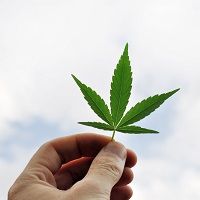Article
Can Marijuana Help Recovering Crack Addicts?
Author(s):
Researchers in Brazil recently noted that marijuana use may mitigate some of the more severe psychiatric side effects associated with crack cocaine addiction, potentially making it easier for addicts to stop using the drug.

One of the common arguments against the legalization of marijuana is that it can be a “gateway” drug, leading to the abuse of “harder” drugs such as heroin, cocaine, crack, and methamphetamines. This theory persists despite evidence that poverty is a much stronger prediction of hard drug use and the fact that evidence from the National Institutes of Health and many others shows that the vast majority of marijuana users don’t go on to use harder drugs.
A recent study in BMC Public Health took the issue in a different direction: What if marijuana could be beneficial for people currently using crack cocaine? The study authors, who are affiliated with the Department of Preventive Medicine, Brazilian Center of Information on Psychotropic Drugs, took a look at the connection between crack users who also use marijuana to see if their reasons for combining both drugs could lead to some clinical benefit.
While the study was a qualitative look at a small subset of only 27 Brazilian crack cocaine users who combined its use with marijuana, it could have practical implications for psychiatrists, addiction specialists, and public health officials, particularly as marijuana use is legalized in states around the country. Further study on the potential therapeutic use of cannabis in crack abusers is unlikely to come from Brazil, however: marijuana remains illegal there.
The study subjects—27 crack cocaine users between the ages of 19 and 49 years—were mostly uneducated, unemployed, and living in shelters or on the street and were crack cocaine-dependent. (One study limitation is that 70% of the subjects were also marijuana-dependent.) All of the participants in the sample reported having had problems with some of the drugs cited, but crack cocaine was the drug that most affected all aspects of their lives, in the form of social difficulties, loss of family, loss of job, loss of social status, and impaired appearance, among many others. Cravings and transient paranoid symptoms were described as the effects of the drug that most contributed to these damages. The participants reported having used various self-devised strategies to either stop crack cocaine use or overcome the problems caused by it. One of those strategies included using marijuana to minimize the unpleasant effects of crack.
The study authors note, “Transient paranoid symptoms, which are a typical effect of crack cocaine use and according to users can cause fear, distrust, and sometimes violent behavior, were the effects that were most commonly mentioned by the interviewees as being suppressed in the presence of marijuana.” Users also cited a reduction in their overall aggressiveness when adding marijuana use to crack use.
The overall findings suggest that some of the quality of life lost with crack cocaine use can be regained with the use of marijuana in combination, including better sleep and better sex. The potential clinical application, of course, is not to encourage marijuana use alongside crack use, but to consider the potential for marijuana to help recovering addicts.




